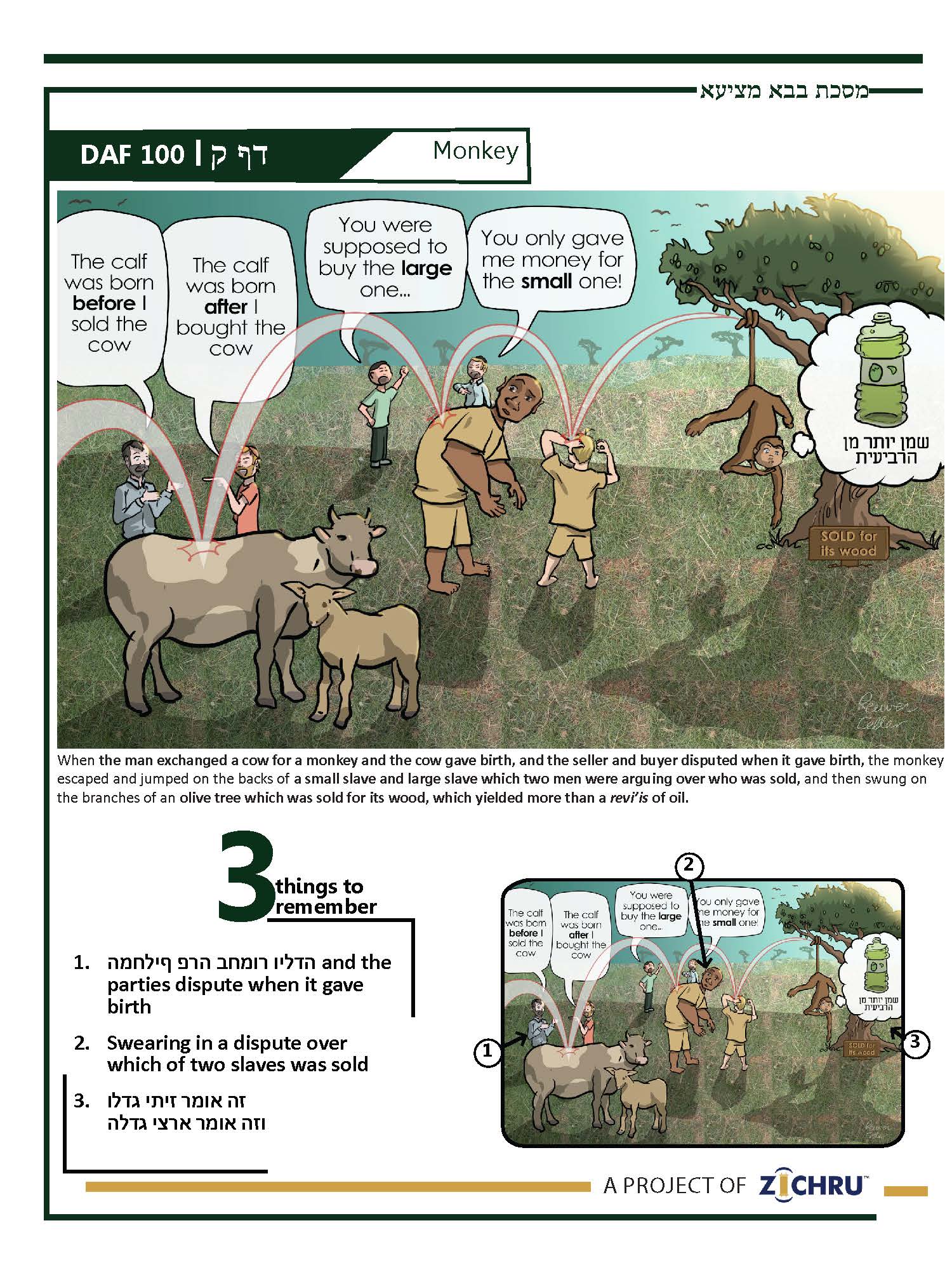Bava Metzia - Daf 100
- Audio Timestamps
0:00 - The 3 Sugyos
2:56 - Review of 3 Sugyos
5:44 - Siman
8:12 - 4 Blatt Back Chazarah
15:56 - Pop Quiz (Last 7 blatt)
- For access to all Zichru resources including PDFs, and illustrations CLICK HERE
- המחליף פרה בחמור וילדה and the parties dispute when it gave birth
The next Mishnah states: המחליף פרה בחמור וילדה – If one exchanges a cow for a donkey, and [the cow] gave birth, or if one sells his שפחה and she gave birth, זה אומר עד שלא מכרתי – and [the seller] says, “The birth occurred before I sold her, and the offspring is mine,” וזה אומר משלקחתי – and [the buyer] says, “The birth occurred after I purchased her, and the offspring is mine,” יחלוקו – they divide the value of the calf or slave child. The Gemara wonders why the offspring is divided: וליחזי ברשות דמאן קיימא – let us see in whose domain it is, and the other litigant will be subject to the principle that המוציא מחבירו עליו הראיה!? Shmuel answers that the calf and slave are standing in places not owned by either party. The Gemara persists: ונוקמא אחזקת דמרא קמא – but establish it on the status of its first owner (the seller), and the buyer must prove that it changed ownership!? The Gemara concludes that the Tanna is Sumchos, who holds: ממון המוטל בספק חולקין בלא שבועה – money whose ownership is in doubt is divided without a shevuah.
- Swearing in a dispute over which of two slaves or fields was sold
The Mishnah stated that if the seller had two slaves or two fields of different sizes, and the buyer claims to have purchased the larger one and the seller claims he sold the smaller one, the seller swears that he sold the smaller one. The Gemara raises three objections to the seller taking an oath: (1) The claim and the admission are about different items!? (2) It is a case of "הילך" – here, it is yours (where the defendant offers the admitted item), which does not generate a shevuah of מודה במקצת!? (3) One never swears on claims involving slaves (or land)!? Three answers are given: (1) Rav explains that one claims he gave an agent money to buy a large slave (or field), and demands the money back, and the agent responds he only was given money to buy a small slave (or field). (2) Shmuel says the buyer claims to have purchased כסות עבד גדול – a garment for a large slave, or עומרי שדה גדולה – the sheaves found in a large field, and the seller responds that he sold the garment of a small slave (i.e., a smaller portion of the larger cloth), or the sheaves of a small field. (3) Rebbe Hoshaya says the buyer claims a large slave with his garment, or a large field with its sheaves, and the shevuah on the מטלטלין requires swearing on the slave/field through גלגול.
- זה אומר זיתי גדלו וזה אומר ארצי גדלה
The next Mishnah states that if one sold his olive trees for their wood, and the buyer did not remove them immediately, and they produced olives of such poor quality that a se’ah of them yielded less than a revi’is (quarter-log) of oil, they belong to the owner of the trees. If they produced olives which yielded more than a revi’is, זה אומר זיתי גדלו – and [the buyer] says, “My olive trees produced the olives, and they are mine,” וזה אומר ארצי גדלה – and [the seller] says, “My land produced the olives by providing nutrients,” יחלוקו – they divide the crop, since they were both instrumental in producing the crop. Similarly, if one’s trees were swept by a river into someone else’s field and produced olives, and the owner of the trees and the owner of the land make the above respective claims, they divide the crop.
The Gemara explains, in the first case, that the seller did not specify when the buyer should remove the trees he purchased for wood, and so does not insist on receiving his share if the inferior crop yields less than a revi’is per se’ah but does demand his share in a more significant crop.
Siman - Monkey
When the man exchanged a cow for a monkey and the cow gave birth, and the seller and buyer disputed when it gave birth, the monkey escaped and jumped on the backs of a small slave and large slave which two men were arguing over who was sold, and then swung on the branches of an olive tree which was sold for its wood, which yielded more than a revi’is of oil.


